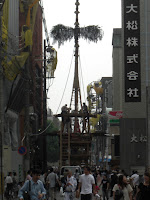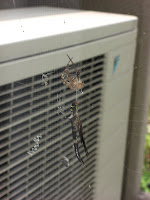Some miscellaneous stories about what I've been through.
-----
According to the scholarship rules, we arrive here as "research students". That is a status of "non-degree-seeking" students. If we want to enter Master's or PhD ("degree-seeking"), we have to take the department's entrance exam. It changes a lot from university to university and from department to department, from those who require no exam at all or just a small exam for formality to tests and interviews that you have to study a lot to pass. The average seems to be somewhere in between, tending to the "study-a-lot" side.
Also, some require students to read and answer in Japanese, other allow answers in English. Some exams are held in August-September, and others in February-March.
That was a silly tutorial for the scholarship. Now, an interesting thing is that, although our visa in Japan declares us as "students", "research students" are often not considered students at all. Especially to get student discounts in trains, mobile phone companies and such...
Existential dilemma: We are told we are students, but some groups do not consider us so. Then what are we???
-----
There's a legend that foreigners who come to Japan never keep their weight. At least during the first months (after that it's up to each person). Men usually get thinner, while women usually get fatter. I don't know the reason for that, but I've seen some situations where that legend was true.
In my case, for example.
People say I don't have weight to lose... and I daresay they may be right. Sometimes I think I'm too thin. But in Japan, either when I went to Himeji or this time in Kyoto, I managed to someway lose more weight.
Much to my mother's concern...
I lost count on how many times she told me I'm too thin and that I have to eat more... I'm not starving... very far from that. But I have to concede that que quality of my meals have deteriorated.
But there was a new comment from her recently: "you look anemic" (based on a picture I'd sent her).
That's a new one...
And there's a friend in Brazil who says that Japanese, especially women, are "too white". They don't get a tan... in some cases, especially girls avoid it at all costs covering themselves even in the hottest of days. Parasol, gloves, long sleeves... on days when people would meld being naked. I imagine what's going on under that "armor"...
So, should I consider that "Japanese whiteness" is contagious and I might have been contaminated!?
-----
One of my favorite games when I meet new people, especially Japanese people, is making them try to guess from which country I'm from. Given my looks, people usually start guessing somewhere around East Asia. After that, they get puzzled when I say I'm not from anywhere in Asia. But they get it when I say I'm from South America... usually on the first try after the hint.
But I was caught in my own game more than once. People asking me to guess where they are from... and I've done stupid mistakes as well...
-----
It doesn't matter how long have you lived in Japan, or how well you think you're used to trains, there's always something stupid you can do...
I was going from my dorm to the main campus with some friends. Can't remember now to do what exactly. We have to transfer to another line for that. But as we were chatting, we didn't notice that we were waiting at the wrong plataform! When the train we were waiting for arrived, we had to rush to the other plataform... barely managing to make it on time. It was tougher for the girls who were wearing heels...
During the same trip, I guess our loud talk (in English) bothered an old salaryman. Before he left some stations before us, he came closer to me and said something (in Japanese) I grasped as being "Japanese don't baheve like that"... Why me!? I wasn't the loudest one! Oh... but I was the only Japanese-looking person...
Another story. Some stations have similar names. If you don't pay attention to where you're going or what ticket you have to buy, you may end up in Tenbabashi (Osaka) when you actually want to go to Tanbabashi (Kyoto)...
-----
Strange coincidences happen. One Saturday, after practicing aikido and studying at the university library, I met a friend on the way home. The Japanese girl I think I've mentioned during the trip to
Keihoku-chou. She was going to a "nagashi soumen" party organized by a international exchange group and invited me to go along.
From the
soumen article in Wikipedia:
"Some restaurants offer sōmen served in the manner of “flowing noodles” in the summer. Flowing Somen is called "Nagashi Sōmen" (流しそうめん, "Nagashi Sōmen"?) in Japanese. The noodles are placed in a long flume of bamboo across the length of the restaurant. The flume carries clear, ice-cold water. As the sōmen come down the flume and pass by, you pluck them out with your chopsticks and then dip them in a container of tsuyu. Catching the noodles requires a fair amount of dexterity, but the noodles that aren't caught by the time they get to the end usually aren't eaten, so diners are pressured to catch as much as they can."So, it's wasteful... but very funny. Trying to catch the noodles; warning that a massive amount is reaching the end; people tripping and breaking the bamboo flume...
Writing a wish on a paper and hanging that paper on bamboo or a tree... (It was
Tanabata... and considering the year, the combination 07-07-07 is catchy for those who believe in numerology.)
And a water small balloon fight that reminded me of some
friends in Brazil...
-----
I had my first
capoeira experience ever in Japan. Weird, huh? There was a workshop around, and a former exchange student invited us to check it out. I don't remember the name of the group, but I remember it was the "Angola" style (I didn't even know there were different styles...) and they usually hold their classes somewhere in Osaka.
With all our flexibility of people who spend most of their time inside their labs, some other Brazilian students and I decided to accept the challenge. I have to say it's interesting, but I don't have the disposition to make it a regular exercise. As an evidence that people can excel in anything they really feel like doing, there were some Japanese who did really great during the practice. It was a little embarassing that the Brazilians were the ones having more trouble... hehe.
The bizarre scene happened on our way to the place. We were a large group, so our block pretty much blocked the street when we were on one of the small streets. So, while we were walking, an old lady simply appeared out of nowhere behind us and pulled her way past the group walking fast...
A very "genki obasan" indeed...
-----
Recently, it was Chi-chan's birthday. She is one of my friends in Himeji, and as the Himeji Gang set a
birthday party for her, I decided to go also.
But here Murphy shows himself again. It was exactly the day of the big earthquake in Niigata Prefecture. When I've mentioned that earthquake
before, I said that "the only effect I've felt so far was a major delay in JR trains on Monday"... Guess to what event I arrived late because of that...
Well, people were considerate enough to save some food for me... hehehe. So, although I've spent more time going and coming back than actually in Himeji (I had to return on the same day, even knowing that it would be hard because of the trains delayed), it was worth the visit. Friends, cake and laughter... Exactly what one needs to forget all those hours at the train station...
-----
Foreign men are sometimes told that getting a Japanese girlfriend is a very nice thing, including a good way to speed their Japanese language ability. Even in my case I've heard such comments many times in Himeji and in Kyoto... from both Japanese people and other foreigners.
No, people. I'm in no rush to get a girlfriend. And I don't have preferences for neither Japanese nor non-Japanese. When it happens, it happens.
But one of those comments floored me... It was just the way it was said...
"Enjoy the local fauna"...
-----
Looks like my
pet spider decided to move.
It used to destroy its web and build another from time to time. And until recently, every new web was at a diferrent location. In such times, it wasn't unusual for it to disappear after destroying the old web, only to reappear a couple of days later with its new web.
It has been weeks that I don't see it anymore. Guess it's found a better place to build a web, without someone who'd annoy it every week after laundry...







